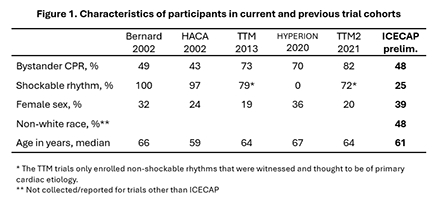Final ID: Sa1403
Baseline characteristics of first 900 patients in Influence of Cooling Duration on Efficacy in Cardiac Arrest Patients (ICECAP) trial
Abstract Body:
Background
Adult out-of-hospital cardiac arrest (OHCA) causes substantial mortality and morbidity. Brain injury from hypoxia/ischemia is a major contributor. Preclinical studies have shown improved neuroprotection in animals treated with prolonged hypothermia. The optimal duration of cooling in humans is unknown. ICECAP (Influence of Cooling Duration on Efficacy in Cardiac Arrest Patients) is an ongoing multicenter, randomized, clinical trial evaluating durations of hypothermic targeted temperature management (TTM) ranging from 6-72 hours. Regulatory and patient stakeholders encouraged inclusive eligibility to provide a representative cohort by etiology, sex, and race.
Research Questions
1. Are longer durations of hypothermia better than shorter durations (is there duration-response?) 2. What is the shortest duration that provides the maximal benefit (i.e., where is the beginning of the plateau of the duration response curve)?
Goals
To describe the diversity of participant characteristics and mortality of the first 900 ICECAP participants (aggregated across all durations of hypothermia) in the context of previous cardiac arrest trial cohorts.
Approach
Parallel cohorts of comatose survivors of cardiac arrest undergoing rapid cooling are stratified at randomization by shockable or non-shockable initial rhythm. The maximum sample size is 1800. The trial uses response adaptive randomization, and interim analyses occur every 50 participants. If the 6-hour duration is estimated to be best, the rhythm type will stop recruitment early. The primary outcome is the 90-day modified Rankin Scale (mRS), a functional measure that ranges from 0 (no symptoms) to 6 (death), transformed into a linear scale.
Results
Between Summer 2020 and Spring 2024 we enrolled 900 participants. The characteristics are summarized in Figure 1. The aggregate mortality at hospital discharge was 71% (49% in shockable and 78% in non-shockable.) We plot the current overall ICECAP mortality alongside other OHCA trials in Figure 2.
Conclusions
The ICECAP trial has successfully recruited over half the planned enrollment. As intended, the study population is highly diverse regarding demographics and etiology. Initially non-shockable rhythms and arrests secondary to overdose are more prevalent than previously reported. This highly representative study cohort means that the trial’s results will be more generalizable than prior studies, allowing evaluation of important subgroups, often excluded in the past.
Background
Adult out-of-hospital cardiac arrest (OHCA) causes substantial mortality and morbidity. Brain injury from hypoxia/ischemia is a major contributor. Preclinical studies have shown improved neuroprotection in animals treated with prolonged hypothermia. The optimal duration of cooling in humans is unknown. ICECAP (Influence of Cooling Duration on Efficacy in Cardiac Arrest Patients) is an ongoing multicenter, randomized, clinical trial evaluating durations of hypothermic targeted temperature management (TTM) ranging from 6-72 hours. Regulatory and patient stakeholders encouraged inclusive eligibility to provide a representative cohort by etiology, sex, and race.
Research Questions
1. Are longer durations of hypothermia better than shorter durations (is there duration-response?) 2. What is the shortest duration that provides the maximal benefit (i.e., where is the beginning of the plateau of the duration response curve)?
Goals
To describe the diversity of participant characteristics and mortality of the first 900 ICECAP participants (aggregated across all durations of hypothermia) in the context of previous cardiac arrest trial cohorts.
Approach
Parallel cohorts of comatose survivors of cardiac arrest undergoing rapid cooling are stratified at randomization by shockable or non-shockable initial rhythm. The maximum sample size is 1800. The trial uses response adaptive randomization, and interim analyses occur every 50 participants. If the 6-hour duration is estimated to be best, the rhythm type will stop recruitment early. The primary outcome is the 90-day modified Rankin Scale (mRS), a functional measure that ranges from 0 (no symptoms) to 6 (death), transformed into a linear scale.
Results
Between Summer 2020 and Spring 2024 we enrolled 900 participants. The characteristics are summarized in Figure 1. The aggregate mortality at hospital discharge was 71% (49% in shockable and 78% in non-shockable.) We plot the current overall ICECAP mortality alongside other OHCA trials in Figure 2.
Conclusions
The ICECAP trial has successfully recruited over half the planned enrollment. As intended, the study population is highly diverse regarding demographics and etiology. Initially non-shockable rhythms and arrests secondary to overdose are more prevalent than previously reported. This highly representative study cohort means that the trial’s results will be more generalizable than prior studies, allowing evaluation of important subgroups, often excluded in the past.
More abstracts on this topic:
A Randomized Clinical Trial for Asymptomatic Elevated Blood Pressure in Patients Discharged from Emergency Department
Prendergast Heather, Khosla Shaveta, Kitsiou Spyros, Petzel Gimbar Renee, Freels Sally, Sanders Anissa, Daviglus Martha, Carter Barry, Del Rios Marina, Heinert Sara
Exploring Novel Data-Driven Clustering Methods for Uncovering Patterns in Longitudinal Neonatal Postoperative Temperature MeasurementsHelman Stephanie, Riek Nathan, Sereika Susan, Olsen Robert, Gaynor J, Lisanti Amy, Al-zaiti Salah


